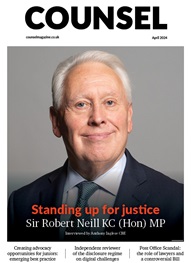*/

Some five years ago, as a law student with a penchant for trusts law and, admittedly, the sound of my own voice, I set my sights on a career at the Commercial Chancery Bar. I undertook a number of mini-pupillages at leading sets in Lincoln’s Inn. While each one served to confirm my career aspirations, women were conspicuous by their relative absence. I still recall that over the course of five commercial chancery mini-pupillages, I met only two female barristers. Naturally, this begged the question: why?
During my two years at a commercial chancery set, I am pleased to say that I am yet to experience a rude awakening in answer to this question. My experience has been (and remains) overwhelmingly positive. My colleagues – barristers and clerks alike – have been supportive and inclusive. This is doubtless due in part to having a female senior clerk at chambers’ helm, the knock-on effect of which is remarkable.
Any preconception that being a successful barrister requires casting a spotlight on more ‘masculine’ characteristics of driving ambition and aggression, while supressing the typically ‘soft’ or ‘feminine’ characteristics of being sensitive and understanding, for example, has been extinguished. On the contrary, I have found that the latter are not only compatible with building a practice at the Commercial Chancery Bar, but positively complementary. Embracing these has proved valuable in forging relationships with professional clients and ensuring that lay clients feel heard and reassured.
An ability to be unapologetically oneself extends, in my experience, to the social side of the Bar. The present-day Commercial Chancery Bar is no longer an exclusive boys’ club, where discussion centres around cricket, rugby and the like. Indeed, I have enlightened my colleagues as to the latest drama in ‘Love Is Blind’, Taylor Swift lore, and why skinny jeans are no longer socially acceptable. Notwithstanding this, there is a respect for the work I do and my ability to do it.
It would be remiss of me, however, to elide the fact that much progress is yet to be achieved. Machismo remains a feature of the Commercial Chancery Bar. For example, marketing events are often male-oriented activities involving heavy inebriation into the small hours. This is more frequently to the exclusion of female clients or colleagues than their male counterparts due, for example, to having greater responsibilities at home. Further, that this area of the Bar is male-dominated means that there is great statistical probability of being the only woman in the room at times. In this respect, there are undeniably greater hurdles for women (even if more perceived than real) to meaningfully network or connect with clients, the majority of whom still tend to be male, sharing more in common with male colleagues.
For me personally, however, the most noticeable discrepancy between young male and female practitioners is a different one altogether. At 23/24 years old, I have at times looked on with envy at my junior male colleagues who are spoiled for choice with role models in whom they may see a reflection of themselves. Of course, I do look up to, learn from and at times lean on my senior male, as well as female, colleagues. However, it was not until I met a former female member of chambers last year that I truly considered the rather more tangible benefit and inspiration that I and my female colleagues would experience if we, too, had a chain of accomplished, brilliant female barristers across the breadth of seniority in chambers, whose lived experience might be more similar to our own.
While it goes without saying that the Commercial Chancery Bar has quite some way to go, I am heartened that in the last five years I have seen increasing numbers of women applying and being recruited to commercial chancery sets, including my own. I am hopeful that this trend will continue. I look forward to seeing articles like this one, which aim to shed light on disparities at the Bar, become increasingly unnecessary; to young women applying to the Commercial Chancery Bar without any doubt as to whether they will fit in; and to hearing more Taylor Swift in chambers’ corridors.

Some five years ago, as a law student with a penchant for trusts law and, admittedly, the sound of my own voice, I set my sights on a career at the Commercial Chancery Bar. I undertook a number of mini-pupillages at leading sets in Lincoln’s Inn. While each one served to confirm my career aspirations, women were conspicuous by their relative absence. I still recall that over the course of five commercial chancery mini-pupillages, I met only two female barristers. Naturally, this begged the question: why?
During my two years at a commercial chancery set, I am pleased to say that I am yet to experience a rude awakening in answer to this question. My experience has been (and remains) overwhelmingly positive. My colleagues – barristers and clerks alike – have been supportive and inclusive. This is doubtless due in part to having a female senior clerk at chambers’ helm, the knock-on effect of which is remarkable.
Any preconception that being a successful barrister requires casting a spotlight on more ‘masculine’ characteristics of driving ambition and aggression, while supressing the typically ‘soft’ or ‘feminine’ characteristics of being sensitive and understanding, for example, has been extinguished. On the contrary, I have found that the latter are not only compatible with building a practice at the Commercial Chancery Bar, but positively complementary. Embracing these has proved valuable in forging relationships with professional clients and ensuring that lay clients feel heard and reassured.
An ability to be unapologetically oneself extends, in my experience, to the social side of the Bar. The present-day Commercial Chancery Bar is no longer an exclusive boys’ club, where discussion centres around cricket, rugby and the like. Indeed, I have enlightened my colleagues as to the latest drama in ‘Love Is Blind’, Taylor Swift lore, and why skinny jeans are no longer socially acceptable. Notwithstanding this, there is a respect for the work I do and my ability to do it.
It would be remiss of me, however, to elide the fact that much progress is yet to be achieved. Machismo remains a feature of the Commercial Chancery Bar. For example, marketing events are often male-oriented activities involving heavy inebriation into the small hours. This is more frequently to the exclusion of female clients or colleagues than their male counterparts due, for example, to having greater responsibilities at home. Further, that this area of the Bar is male-dominated means that there is great statistical probability of being the only woman in the room at times. In this respect, there are undeniably greater hurdles for women (even if more perceived than real) to meaningfully network or connect with clients, the majority of whom still tend to be male, sharing more in common with male colleagues.
For me personally, however, the most noticeable discrepancy between young male and female practitioners is a different one altogether. At 23/24 years old, I have at times looked on with envy at my junior male colleagues who are spoiled for choice with role models in whom they may see a reflection of themselves. Of course, I do look up to, learn from and at times lean on my senior male, as well as female, colleagues. However, it was not until I met a former female member of chambers last year that I truly considered the rather more tangible benefit and inspiration that I and my female colleagues would experience if we, too, had a chain of accomplished, brilliant female barristers across the breadth of seniority in chambers, whose lived experience might be more similar to our own.
While it goes without saying that the Commercial Chancery Bar has quite some way to go, I am heartened that in the last five years I have seen increasing numbers of women applying and being recruited to commercial chancery sets, including my own. I am hopeful that this trend will continue. I look forward to seeing articles like this one, which aim to shed light on disparities at the Bar, become increasingly unnecessary; to young women applying to the Commercial Chancery Bar without any doubt as to whether they will fit in; and to hearing more Taylor Swift in chambers’ corridors.


Sam Townend KC explains the Bar Council’s efforts towards ensuring a bright future for the profession
Giovanni D’Avola explores the issue of over-citation of unreported cases and the ‘added value’ elements of a law report
Louise Crush explores the key points and opportunities for tax efficiency
Westgate Wealth Management Ltd is a Partner Practice of FTSE 100 company St. James’s Place – one of the top UK Wealth Management firms. We offer a holistic service of distinct quality, integrity, and excellence with the aim to build a professional and valuable relationship with our clients, helping to provide them with security now, prosperity in the future and the highest standard of service in all of our dealings.
Is now the time to review your financial position, having reached a career milestone? asks Louise Crush
If you were to host a dinner party with 10 guests, and you asked them to explain what financial planning is and how it differs to financial advice, you’d receive 10 different answers. The variety of answers highlights the ongoing need to clarify and promote the value of financial planning.
Most of us like to think we would risk our career in order to meet our ethical obligations, so why have so many lawyers failed to hold the line? asks Flora Page
If your current practice environment is bringing you down, seek a new one. However daunting the change, it will be worth it, says Anon Barrister
Creating advocacy opportunities for juniors is now the expectation but not always easy to put into effect. Tom Mitcheson KC distils developing best practice from the Patents Court initiative already bearing fruit
Sam Townend KC explains the Bar Council’s efforts towards ensuring a bright future for the profession
National courts are now running the bulk of the world’s war crimes cases and corporate prosecutions are part of this growing trend, reports Chris Stephen